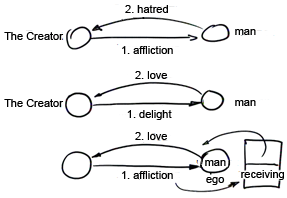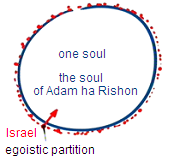Affliction Is A Test For Love
 We love the Creator as the source from which we derive pleasure. Clearly, this is egoistic and conditional love. If the Creator sent us affliction instead, we would certainly reply to Him with hatred.
We love the Creator as the source from which we derive pleasure. Clearly, this is egoistic and conditional love. If the Creator sent us affliction instead, we would certainly reply to Him with hatred.

But when a person, called “a worker of the Creator,” doing spiritual work suffers, he associates the affliction with his egoism and tries to relate to the Creator with love. It means that he divides himself into two parts, the part that receives and the one that bestows. In the receiving part, he feels suffering, but he desires to transcend above it. And then, he relates to his sufferings as a “check” that his love does indeed cover all of transgressions and that he can rise above all the states that give him pain.
Then, he understands, sees, and knows for sure that his attitude to the Creator is independent of his ego. Otherwise, he has no means or criteria for testing.
Therefore, the relationship with the Creator is based on the fact that he annuls himself for the sake of bestowal, that he perceives his original egoism as worse than death. But only under this condition can he be sure that his love for the Creator is unconditional and perfect.
[85309]
From the Preparation to the Daily Kabbalah Lesson 8/12/12
Related Material:
Unnecessary Sufferings
A Step Forward
The Last Gate








